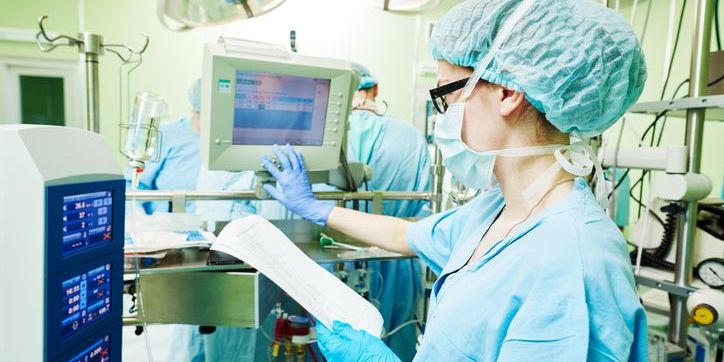What is a Perfusionist?
A perfusionist operates the heart-lung machine during cardiac surgeries and other procedures requiring cardiopulmonary bypass. Their primary responsibility is to maintain the patient's circulation and oxygenation while the heart is stopped, allowing the surgeon to perform intricate procedures on the heart or other organs. Perfusionists carefully monitor the patient's vital signs, blood flow, oxygen levels, and electrolyte balance throughout the procedure, adjusting the settings of the heart-lung machine as needed to support the patient's physiological needs.
Perfusionists work closely with cardiac surgeons, anesthesiologists, nurses, and other members of the surgical team to ensure safe and effective perfusion support for patients undergoing cardiac surgery or other complex procedures requiring cardiopulmonary bypass.
What does a Perfusionist do?

Duties and Responsibilities
Perfusionists have several key duties and responsibilities, including:
- Operating Heart-Lung Machines: Perfusionists operate the heart-lung machine, also known as the cardiopulmonary bypass machine, during cardiac surgeries and other procedures requiring cardiopulmonary support. They ensure the proper functioning of the machine to maintain the patient's circulation and oxygenation while the heart is stopped.
- Monitoring Patient Vital Signs: Perfusionists monitor the patient's vital signs, blood flow, oxygen levels, and electrolyte balance throughout the procedure. They use specialized monitoring equipment to assess the patient's physiological status and make adjustments to the heart-lung machine settings as needed to support the patient's cardiovascular function.
- Administering Medications: Perfusionists may administer medications, blood products, or other fluids as prescribed by the medical team to maintain hemodynamic stability and support the patient's circulation during surgery. They monitor the patient's response to medications and adjust dosages as necessary to achieve optimal therapeutic effects.
- Providing Extracorporeal Support: In addition to cardiac surgery, perfusionists may provide extracorporeal life support (ECLS) for patients with severe cardiac or respiratory failure. This may involve operating extracorporeal membrane oxygenation (ECMO) machines to temporarily support heart and lung function until the patient's condition stabilizes.
- Collaborating with Surgical Team: Perfusionists work closely with cardiac surgeons, anesthesiologists, nurses, and other members of the surgical team to coordinate patient care and ensure the safe and effective conduct of cardiac surgery or other complex procedures requiring cardiopulmonary bypass.
- Ensuring Safety and Quality: Perfusionists adhere to established protocols, guidelines, and safety standards to minimize the risk of complications and ensure the highest standards of patient care and safety during cardiac surgery and other procedures. They maintain accurate records of perfusion parameters, medications administered, and other relevant data to facilitate continuity of care and documentation.
Types of Perfusionists
Perfusionists specialize in various areas of perfusion practice, each focusing on different aspects of cardiac and circulatory support. Here are some common types of perfusionists:
- Cardiovascular Perfusionist: Cardiovascular perfusionists specialize in providing cardiopulmonary bypass support during cardiac surgeries, including coronary artery bypass grafting, valve repair or replacement, and congenital heart defect repair. They operate the heart-lung machine to maintain circulation and oxygenation while the heart is stopped, allowing the surgeon to perform intricate procedures on the heart or other organs.
- Pediatric Perfusionist: Pediatric perfusionists specialize in providing perfusion support for pediatric patients undergoing cardiac surgery or other procedures requiring cardiopulmonary bypass. They have specialized training in managing the unique physiological needs and challenges of pediatric patients, including infants and children with congenital heart defects or acquired cardiac conditions.
- Extracorporeal Life Support (ECLS) Specialist: ECLS specialists, also known as ECMO specialists, focus on providing extracorporeal life support (ECLS) for patients with severe cardiac or respiratory failure. They operate extracorporeal membrane oxygenation (ECMO) machines to temporarily support heart and lung function, providing oxygenation and circulation for patients whose own heart and lungs are unable to adequately perform these functions.
- Transplant Perfusionist: Transplant perfusionists specialize in providing perfusion support for organ preservation and transplantation procedures. They are responsible for perfusing donor organs with a preservation solution to maintain organ viability during procurement and transport, as well as preparing the organs for transplantation into the recipient.
- Research Perfusionist: Research perfusionists work in academic or research settings, conducting studies and investigations related to perfusion techniques, technologies, and outcomes. They may collaborate with researchers, clinicians, and industry partners to develop and evaluate new perfusion strategies, devices, and therapies aimed at improving patient care and outcomes in cardiac surgery and critical care.
What is the workplace of a Perfusionist like?
Perfusionists work in a variety of healthcare settings, primarily in hospitals and medical centers where cardiac surgeries and other complex procedures requiring cardiopulmonary support are performed. Within these facilities, perfusionists typically work in operating rooms, cardiac catheterization labs, and intensive care units, where they provide perfusion support for patients undergoing cardiac surgery, ECMO therapy, or other procedures requiring extracorporeal circulation.
The workplace environment for perfusionists is often fast-paced and dynamic, with a focus on providing timely and effective perfusion support for patients undergoing surgical interventions. They collaborate closely with cardiac surgeons, anesthesiologists, nurses, and other members of the surgical team to ensure seamless coordination of patient care and optimal outcomes. Perfusionists may also interact with patients and their families before and after surgery to provide information, reassurance, and support regarding the perfusion process and its implications for patient care.
In addition to hospital settings, some perfusionists may work in specialized healthcare facilities such as cardiac surgery centers, transplant centers, or pediatric hospitals, where they provide perfusion support for patients with specific medical needs or conditions. Research perfusionists may work in academic or research institutions, conducting studies and investigations related to perfusion techniques, technologies, and outcomes.